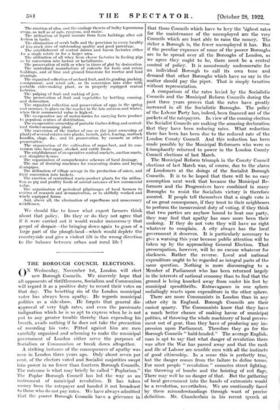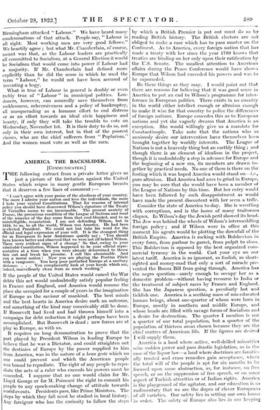THE BOROUGH COUNCIL ELECTIONS. .
ON Wednesday, November 1st, London will elect new Borough Councils. We sincerely hope that all opponents of thriftlessness, Socialism and Communism will regard it as a positive duty to record their votes on that day. The besetting sin of the London municipal voter has always been apathy. He regards municipal politics as a side-show. He forgets that general dis- approval of very high rates, and even the passionate indignation which he is so apt to express when he is not put to any greater trouble thereby than expending his breath, avails nothing if he does not take the precaution of recording his vote. Pitted against him are men carefully organized and scheming to make the municipal government of London either serve the purposes of Socialism or Communism or break down altogether.
A striking instance of the consequences of apathy was seen in London three years ago. Only about seven per cent. of the electors voted and Socialist majorities swept into power in no fewer than fourteen Borough Councils. The outcome is what may briefly be called " Poplarism." The Poplar Borough Council has led the way as an instrument of municipal revolution. It has taken money from the ratepayer and handed it out broadcast to those who do not pay rates. We have always admitted that the poorer Borough Councils have a grievance in that those Councils which have to levy the Ilighest rates for the maintenance of the unemployed are the very Councils which are least able to raise the money. The richer a Borough is, the fewer unemployed it has. But if the peculiar expenses of some of the poorer Boroughs are to be spread over all the Boroughs of London, as we agree they ought to be, there must be a central control of policy. It is monstrously undemocratic for an individual Borough to call its own tune and demand that other Boroughs which have no say in the matter should pay the piper. That is simply taxation without representation.
A comparison of the rates levied by the Socialistic Councils and the Municipal Reform Councils during the past three years proves that the rates have greatly increased in all the Socialistic Boroughs. The policy of the Labour Party has, indeed, been financed out of the pockets of the ratepayers. In view of the coming election the Socialist Councils are making the amazing declaration that they have been reducing rates. What reduction there has been has been due to the reduced rate of the London County Council. And this reduction has been made possible by the Municipal Reformers who were so tiumphantly returned to power in the London County Council elections of last March.
The Municipal Reform triumph in the County Council elections of last March was, of course, due to the alarm of Londoners at the doings of the Socialist Borough Councils. It is to be hoped that there will be no easy assumption next week that because the Municipal Re- formers and the Progressives have combined in many Boroughs to resist the Socialists victory is therefore assured. If people tell themselves that a single vote is of no great consequence, if they trust to their neighbours to perform the inconvenient duty of voting, if they think that two parties are anyhow bound to beat one party, they may find that apathy has once more been their undoing. If they do not vote they will have no right whatever to complain. A city always has the local government it deserves. It is particularly necessary to give a warning this year because public attention will be taken up by the approaching General Election. That preoccupation, however, will be no excuse whatever for slackness. Rather the reverse. Local and national expenditure ought to be regarded as integral parts of the same question. Nothing is more discouraging to a Member of Parliament who has been returned largely in the interests of national economy than to find that the ground is being knocked away from under his feet by municipal spendthrifts. Extravagance in one sphere unfailingly reacts upon expenditure in the other sphere. There are more Communists in London than in any other city in England. Borough Councils are their easiest quarry. The Communists know that they have a much better chance of making havoc of municipal politics, of throwing the whole machinery of local govern- ment out of gear, than they have of producing any im- pression upon Parliament. Therefore they go for the Borough Councils " bald-headed." The average English- man is apt to say that what danger of -revolution there was after the War has passed away and that the rank and file of Labour are sensible men with all the instincts of good citizenship. In a sense this is perfectly true, but the danger comes from the failure to define terms. For most people " revolution " connotes street fighting, the throwing of bombs and the hoisting of red flags.
There may well be no danger of that. But the gathering of local government into the hands of extremists would be a revolution, nevertheless. We are continually faced by these misunderstandings through want of precise definition. Mr. Chamberlain in his recent speech at -Birmingham attacked " Labour." We have heard many condemnations of that attack. People say, " Labour is all right. Most working men are very good fellows." We heartily agree ; but what Mr. Chamberlain, of course, meant was that, as the Labour leaders are practically all committed to Socialism, at a General Election it would be Socialism that would come into power if Labour had a majority. If Mr. Chamberlain had defined more explicitly than he did the sense in which he used the term " Labour," he would not have been accused of inventing a bogy.
What is true of Labour in general is doubly or even trebly .true of " Labour " in municipal politics. Lon- doners, however, can assuredly save themselves from recklessness, subversiveness and a policy of bankruptcy, all masquerading as a humane effort to end distress or as an effort towards an ideal civic happiness and beauty, if only they will take the trouble to vote on Wednesday, November 1st. It is their duty to do so, not only in their own interest, but in that of the poorest classes, who are the chief sufferers from " Poplarism." And the women must vote as well as the men.











































 Previous page
Previous page